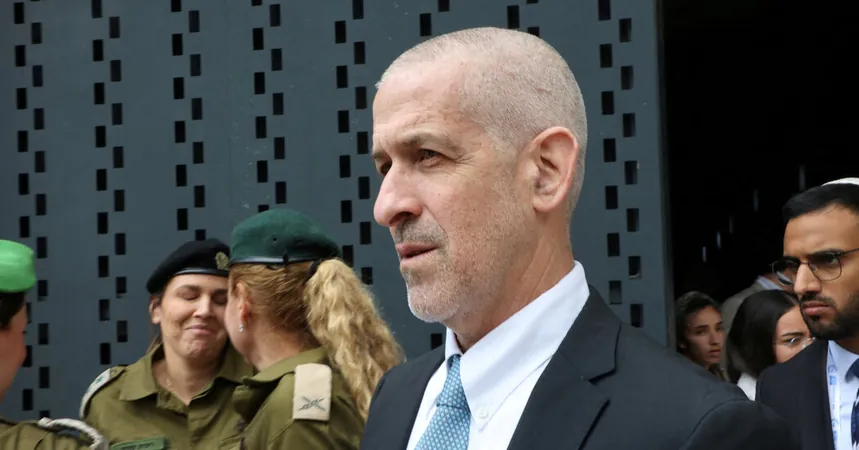
Israel’s Supreme Court Faces Pivotal Moment as Netanyahu Aims to Dismiss Spy Chief
2025-04-08
Author: Ting
Israel's Supreme Court commenced a high-stakes hearing on Tuesday regarding Prime Minister Benjamin Netanyahu's controversial decision to remove Ronen Bar, the head of the Shin Bet security service. This courtroom showdown could potentially trigger a constitutional crisis in the nation, already fraught with political tension.
Netanyahu's attempt to oust Bar has deepened the rift within Israeli society. Proponents of the government accuse Bar of lacking loyalty to the Prime Minister, while critics warn that this action threatens the autonomy of critical democratic institutions. The hearing, streamed live for the public, was marred by disorderly conduct, ultimately forcing the Supreme Court panel to continue without an audience.
Key Questions Surrounding the Case
The recent firing of Ronen Bar arises amid allegations that Shin Bet was probing Netanyahu's aides concerning possible corruption linked to their dealings with Qatar. In his defense, Netanyahu has claimed he no longer trusts Bar, while critics assert that this dismissal is part of a broader strategy to consolidate power by eliminating dissenting voices within the security establishment.
Legal experts suggest that the Supreme Court may have grounds to nullify Bar's firing, creating a complex dilemma for Netanyahu's administration. A ruling against the Prime Minister could either deliver a significant blow to his authority or lead to an unprecedented refusal to recognize the court's decision, heightening fears of a constitutional crisis.
Wider Implications for Israeli Democracy
Critics argue that Netanyahu's moves, including the firing of Bar, align with a troubling trend towards autocracy in Israel. By sidelining Bar, Netanyahu appears to be seeking greater influence over Shin Bet, an agency crucial for national security. Despite the state’s ongoing military occupation in the West Bank, within its recognized borders, Israel remains a democratic nation featuring a strong judicial system and vibrant media landscape.
Since reclaiming leadership in 2022, Netanyahu has pursued various reforms aimed at diminishing the checks on executive power. Notably, his administration proposed a contentious judicial overhaul that challenged the Supreme Court's ability to check governmental authority, a move that sparked mass protests by citizens concerned about the erosion of freedoms.
Potential Outcomes and Next Steps
As the Supreme Court deliberates, it has issued an interim order halting Bar's dismissal while still permitting Netanyahu to explore candidates for his replacement. Should the court find that the motivations behind Bar's firing were influenced by conflicts of interest stemming from ongoing investigations into Netanyahu’s office, they could deem the dismissal unlawful. Alternatively, the justices might rule that the purported reasons for firing Bar do not meet the standards needed for such action against a civil servant.
A Crucial Test for the Future of Governance
The possibility of a constitutional crisis looms over this legal battle. Netanyahu has long clashed with the Supreme Court, openly questioning its authority regarding significant governmental decisions. He has refrained from committing to uphold the court's ruling should it overturn Bar’s dismissal.
A refusal to accept the Supreme Court's legitimacy could destabilize an essential security agency during tumultuous times while also redefining the balance of power in Israel. Some of Netanyahu’s allies have echoed his sentiments, suggesting that the court should not interfere in what they regard as executive matters, reinforcing a growing divide between the branches of government.
As the world watches, the unfolding drama in Israel holds implications not just for its internal politics but also for its future as a democracy capable of balancing power and protecting civil liberties amid rising tensions.
 Brasil (PT)
Brasil (PT)
 Canada (EN)
Canada (EN)
 Chile (ES)
Chile (ES)
 Česko (CS)
Česko (CS)
 대한민국 (KO)
대한민국 (KO)
 España (ES)
España (ES)
 France (FR)
France (FR)
 Hong Kong (EN)
Hong Kong (EN)
 Italia (IT)
Italia (IT)
 日本 (JA)
日本 (JA)
 Magyarország (HU)
Magyarország (HU)
 Norge (NO)
Norge (NO)
 Polska (PL)
Polska (PL)
 Schweiz (DE)
Schweiz (DE)
 Singapore (EN)
Singapore (EN)
 Sverige (SV)
Sverige (SV)
 Suomi (FI)
Suomi (FI)
 Türkiye (TR)
Türkiye (TR)
 الإمارات العربية المتحدة (AR)
الإمارات العربية المتحدة (AR)